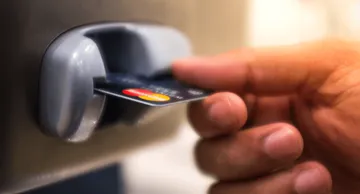

Fake Merchants
Protect your money when shopping online
Do you enjoy shopping online? Found a unique or brand-new e-shop? Before you start shopping, make sure you check everything first.
How to spot a fake e-shop:
- Prices are often much lower than competitors.
- You can’t find reliable reviews or ratings online.
- Terms and conditions are hidden, contact details are vague, and the shop doesn’t offer cash on delivery.
How to protect yourself:
- Always check who you’re buying from.
- Be careful what you confirm and to whom.
- Never share your login details, passwords or full card numbers with anyone.
TIP: For your first purchase from an unknown e-shop, use cash on delivery or a one-time virtual card.
Warning signs of a fraudulent seller:
- The website doesn’t clearly state who operates the e-shop, so you don’t know who you’re contracting with or who to claim your rights against. No information about returns or complaints.
- The website does not display its Terms and Conditions.
- Offers “branded goods” at suspiciously low prices (likely counterfeits).
- Provides insufficient product details.
- Terms mention only a supplier (e.g., a company in China) whose details can’t be verified, while the site looks like a Czech retailer. Even though the seller targets the Czech market, the terms say: “The contract and related matters are governed by the law of the People’s Republic of China.”
- Hidden fees or charges not disclosed on the website.
These warning signs apply not only to e-shops but also to second-hand platforms (e.g., Vinted.cz, Facebook Marketplace). Stay alert in these cases too.
You can also become a victim when selling. Here are some scenarios in practice.
- A “buyer” contacts you and asks you to pay a fee for delivery or insurance, promising to add it to the purchase price. You pay, but the buyer disappears.
- A “buyer” sends you a fake payment confirmation (e.g., a document or a link to PayPal). The money never arrives, but they demand the goods or a refund, threatening police action and even mentioning Interpol or the FBI.
If you’ve been scammed:
- File a criminal complaint with the Czech Police. Even if the amount seems small (e.g., CZK 400), multiply it by 30 victims and the fraudster gains CZK 12,000. If no one reports it, they keep going.
- Visit our nearest branch with the complaint or call our Client Centre at 277 207 207. You can also call for free directly from the George app.
The best protection is prevention:
- Read reviews and warnings from other users online (not just on the site you’re buying from).
- Check the seller’s website for terms and conditions, return policy and company details.
- If the seller isn’t verified, choose cash on delivery.
- For companies, check their ID number on www.justice.cz or www.info.mfcr.cz to confirm:
- the company exists,
- it’s not in insolvency,
- it hasn’t suspended or ended its business,
- who the owner or director is.
- For individuals, look for reviews or ratings on the platform. You can also search their phone number online.
- Read reviews not only about sellers but also buyers.
- The Czech Trade Inspection Authority website (www.coi.cz) is a good source. In the “For Consumers” section, you’ll find “Risky e-shops.” If your shop is listed, you’ll see why it’s considered problematic.
- If you’re selling, never send goods before you actually receive the money.
- When selling, never pay any fees – you’re the seller, you should receive the money.
More information


Security and data protection

Security commandments

Skimming
